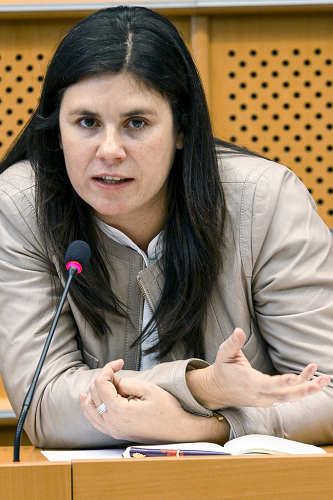Rozière: Protecting traditional products could boost demand and create jobs
Traditional products from Calais lace to Scottish tartans could soon enjoy extra protection in the form of geographical indications, reassuring consumers about their origin and quality. This already exists for food products, but on Tuesday the EP's legal affairs committee votes on a proposal to extend this to non-agricultural products as well. We spoke to French S&D member Virginie Rozière, who is in charge of steering the plans through Parliament, about why the new rules are needed.

Virginie Rozière
What products could benefit from these new rules?
We all know plenty of products that are based on traditional knowledge and production methods: the Laguiole knives, Calais lace, Bohemian crystal, Scottish tartans, Carrara marble and Meissen porcelain, to name some of the most famous ones.
A protected geographical indication is for example a name or a symbol which refers to the geographical origin of a product and to a traditional know-how. The types of products are ceramics, pottery, stone, marble, lace, traditional fabric, as well as jewellery, including precious stones. The European Commission has identified more than 800 products that are likely to benefit from it.
Why should we protect these products at EU level?
Because these products are famous, some companies sometimes use the names of these products, but there is no certainty that they come from the same region or that quality standards have been met. This situation can confuse consumers and harm the reputation of the genuine products. Currently, the protection of those products remains unsatisfactory as only 15 member states have specific national legislation on this.
In France, in certain sectors such as textile, companies estimate that the protection of non-agricultural indications could lead to an increase of up to 25% in international demand. An effective EU scheme could foster the preservation of jobs in the place of origin, which are often rural areas.
How would consumers and businesses benefit from this?
EU-wide protected geographical indications increase the attractiveness of a product for consumers, because the place of origin and specified characteristics are guaranteed, and for producers because it allows them to increase the added value of their products.
It can thus protect traditional manufacturers and increase their willingness to invest. Protected geographical indications can also improve the image of the place of origin, thus promoting tourism and creating jobs.
Source: European Parliament
- 278 reads
Human Rights
Ringing FOWPAL’s Peace Bell for the World:Nobel Peace Prize Laureates’ Visions and Actions

Protecting the World’s Cultural Diversity for a Sustainable Future

The Peace Bell Resonates at the 27th Eurasian Economic Summit

Declaration of World Day of the Power of Hope Endorsed by People in 158 Nations

Puppet Show I International Friendship Day 2020

